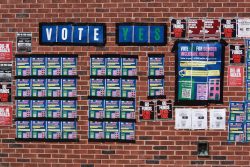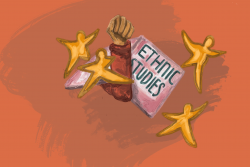Students need effective leaders for the Georgetown University Student Association—ones who don’t just promise change, but who can advocate and deliver tangible results. Our most effective advocates next year would be Kaydee Bridges (SFS ‘03) and Mason Ayer (SFS ‘03). Under them, GUSA could be a vehicle for positive and meaningful action.
Bridges and Ayer know what GUSA can realistically do. Their platform focuses on small but achievable goals that will directly benefit students, such as implementing a comprehensive new Georgetown website, renting an additional van for the SafeRides program and encouraging the Department of Public Safety to patrol Burleith. They would also like to expand student activities at Hoyas, including adding more student bartender nights. Each has experience—Bridges currently chairs the GUSA Student Services Committee and served on the GOCard Committee; Ayer is Vice Chair of the Student Activities Commission and has had extensive contact with various administrators.
The Bridges/Ayer ticket feels that GUSA can be effective advocates for students. For this reason, they oppose the upcoming Yard referendum on Monday’s ballot, which would lead to the establishment of an alternative government structure. The candidates understandably have serious concerns about The Yard’s funding system for on-campus organizations—specifically, the strong possibility that smaller clubs would receive minimal funding. Ultimately Bridges and Ayer see no need to overhaul the existing structure, which can be, under strong leadership, a real advocate for students.
Of the five tickets, Bridges/Ayer would direct GUSA most effectively. Their platform, however, does lack focus. It lays out 15 pages of various proposals, but no one proposal is given special attention. It might be nice to have a coffee shop inside Lauinger Library but it certainly shouldn’t be given as much priority as improving student-neighborhood relations, securing more student space and pushing DPS to expand its jurisdiction into Burleith. They also seemed unprepared to discuss the creation of a gay, lesbian, bisexual and transgender resource center, a top priority for any incoming administration, and evaded any discussion of GUSA’s recent debate over affirmative action.
For these reasons, we offer our conditional endorsement to Kaydee Bridges and Mason Ayer. If elected, they must re-organize and think through their top priorities. Bridges/Ayer aren’t going to pass each of their 44 separate proposals but, hopefully, they will focus on and push through the most important ones.
Matthew Brennan (SFS ‘03) and Sean Hawks (CAS ‘04), have experience dealing with administrators and seems capable of pushing for a more powerful GUSA. The Brennan/Hawks platform offers a number of good proposals—in particular, getting free legal advice for students who live off-campus—but their proposal to give each club a lump-sum fund at the beginning of the year just isn’t viable. The University isn’t going to entrust clubs with large sums of the money without holding them accountable for specific costs and projects—let alone permitting clubs to reuse money from the previous year, as Brennan also proposes. Clubs could potentially mismanage their money, which would weaken their effectiveness.
Brennan’s stance toward the upcoming Yard referendum is unclear and a bit troubling; he actively supported the Yard last year, but then resigned from The Yard Steering Committee. He generally disagrees with The Yard’s funding system; still, he is leaning toward voting for the upcoming referendum and generally supports The Yard’s governing principles. Completely overhauling GUSA and replacing it with an untested structure about which most students have little knowledge isn’t in the University’s best interests—and neither is supporting the Brennan/Hawks ticket.
Robert Wingate-Robinson (MSB ‘03) and Vinoda Basnayake (MSB ‘03) care deeply about students—especially the underprivileged and those disillusioned with student politics in general. Their passion is admirable but they are unqualified to lead GUSA. They seem unaware of how student organizations actually function and, furthermore, haven’t taken the time to familiarize themselves with important campus issues—they were unaware, for instance, that GUSA had already supported the creation of the GLBT resource center. The ticket also talked about setting up a financial relief bank to assist underprivileged students but offered no specifics of how it would be administered. Both candidates pledged to make GUSA more diverse—they continually touted their unaffiliation with GUSA—but that doesn’t make them qualified to be GUSA executives.
Similarly, both Adi Kumar (CAS ‘03) and Rob Hutton (SFS ‘04) are genuine in their desire to want to help students, but they too lack experience—both within GUSA and with handling administrators. They want to bring a “fresh perspective” to GUSA—but so do all the executive candidates—and aside from small proposals such as getting a University-wide mandate for teacher evaluations, the ticket doesn’t offer much of a vision. They talk about eliminating taxes on student textbooks—a noble goal, but GUSA as an organization just isn’t going to accomplish this. They also vacillate on The Yard—saying it’s good in theory but bad in practice. GUSA executives need to see GUSA as an effective lobbying organization—something that can work. And Kumar and Hutton won’t make GUSA work
Trey Street (SFS ‘03) and Dan Spector (CAS ‘04) offer a “Strategic Vision” for Georgetown, but their platform doesn’t offer any achievable goals. They want to implement a new Engineering program, one in Journalism/Communications and one in Environmental Studies. But consider that University faculty and administrators has spent years arguing over how to change the current core curriculum requirements for students. GUSA just isn’t going to push through three entirely new academic departments.
Equally impractical is their proposal to set up a Georgetown Council, a governing body that would bring together faculty, administrators, staff and unelected students. Simply getting together important campus figures for regular meetings would itself be a nearly impossible endeavor, let alone making it work. And, as proposed, the council would basically supplant GUSA and, worse, let unelected students make important decisions for everyone else. To their credit, both Street and Spector are extremely personable are more than comfortable explaining their rationale for GUSA. Still, we’re more comfortable about what GUSA can realistically achieve.
That’s why we’re comfortable with Kaydee Bridges and Mason Ayer. They offer a comprehensive and realistic plan for bringing a better GUSA closer to more students. On Monday, vote Bridges/Ayer.




